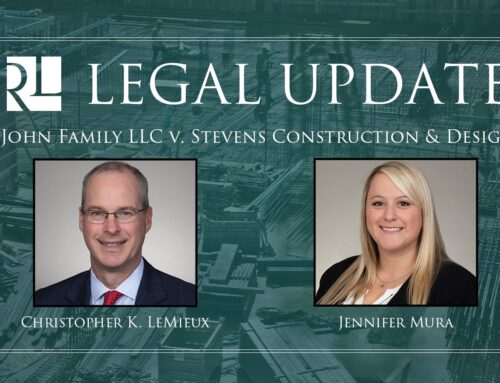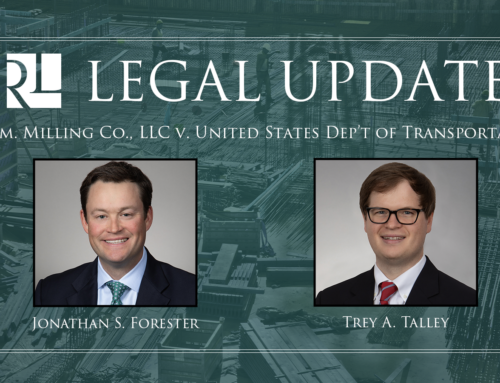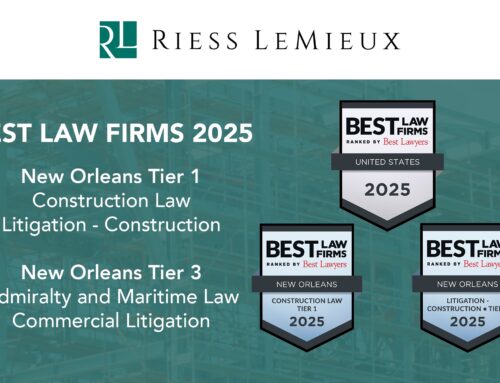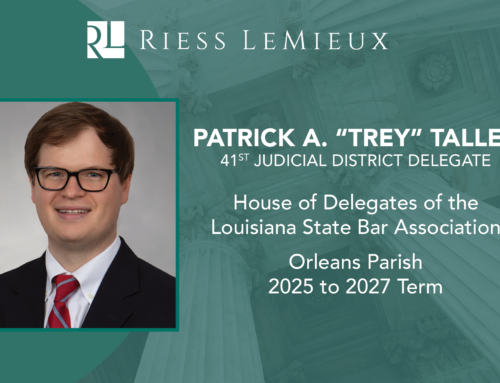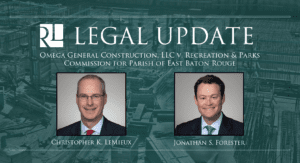
Case Summary: Omega General Construction, LLC v. Recreation & Parks Commission for Parish of East Baton Rouge 2021 WL 6064212
Authors: Christopher K. LeMieux and Jonathan S. Forester
Louisiana Court of Appeals for the 1st Circuit Affirms Summary Judgment of Settlement Agreement as Relinquishment of Cause of Action under Louisiana Public Works Act
In a recent decision, Omega Gen. Constr., LLC v. Recreation & Parks Comm’n For Par. Of E. Baton Rouge, the First Circuit Court of Appeals of Louisiana reviewed a motion for summary judgment from the 19th Judicial District of East Baton Rouge Parish which sustained the peremptory exception of res judicata in favor of the East Baton Rouge Recreation and Parks Commission (“BREC”). 2021 WL 6064212 (La. App. 1 Cir. 12/22/21), reh’g denied (Feb. 10, 2022), writ denied, 2022-00426 (La. 5/3/22).
The main issue in the case was whether a general contractor could compromise its breach of contract claims through a settlement agreement even though waivers of those claims are not permissible under Louisiana Revised Statute 38:2191, commonly called the Louisiana Public Works Act (“LPWA”).
Omega General Construction LLC (“Omega”) was contracted by the East Baton Rouge Parish Recreation and Parks Commission (“BREC”) to build a new visitor center to be named Magnolia Mound Visitor Center. Omega contends that BREC failed to make the final payment that was due after formal final acceptance, and with the forty-five-day lien period covered under the LPWA having expired. However, instead of filing a mandamus action at that time, Omega chose to enter into a change order where it agreed to the deduction of $63,500.00 from the contract sum for 127 days of liquidated damages which was covered under the original contract. After agreeing to the change order, Omega entered into a settlement agreement, which compromised any remaining claims between the parties including Omega’s claim for $63,500.00 of liquidated damages.
Omega first argued the settlement agreement was precluded by law because upon the expiration of the forty-five day lien period under the LPWA, Omega was entitled to full payment under the contract. According to Omega, this meant BREC’s effort to force Omega to waive its right to payment through the change order and the settlement agreement was without effect.
The Court distinguished between a waiver, which is prohibited under the LPWA, and a compromise, which is not. The Court clarified that although the LPWA “[i]ndicates that the provisions of the statute are not subject to waiver, it does not prohibit
parties from entering into a compromise to resolve their differences.” The Court further noted it will not declare a legal compromise “[v]oid without a clear showing that they violate good morals or public interest.”
According to the Court, the settlement agreement was clearly stated as a compromise. Omega was not asked to expressly waive or relinquish a known right. Further, upon fulfillment of the payment obligations set forth in the settlement agreement and acceptance by BREC of all work described in the settlement agreement, Omega released BREC from all liability whatsoever for all possible claims. Thus, Omega’s claims against BREC were released in exchange for consideration, which constitutes a compromise, and since the settlement agreement did not violate good morals or public interest, it was considered legally binding.
Lastly, the Court ruled BREC’s peremptory exception of res judicata precluded the mandamus action filed by Omega because all five factors of res judicata were met: (1) the judgment is valid; (2) the judgment is final; (3) the parties are the same; (4) the cause(s) of action asserted in the second suit existed at the time of final judgment in the first litigation; and (5) the cause(s) of action asserted in the second suit arose out of the transaction or occurrence that was the subject matter of the first litigation.
This case establishes the clear rule that while general contractors cannot expressly waive their rights under the LPWA, they may absolve all liability through a settlement agreement from the public entities with whom they are contracted.
